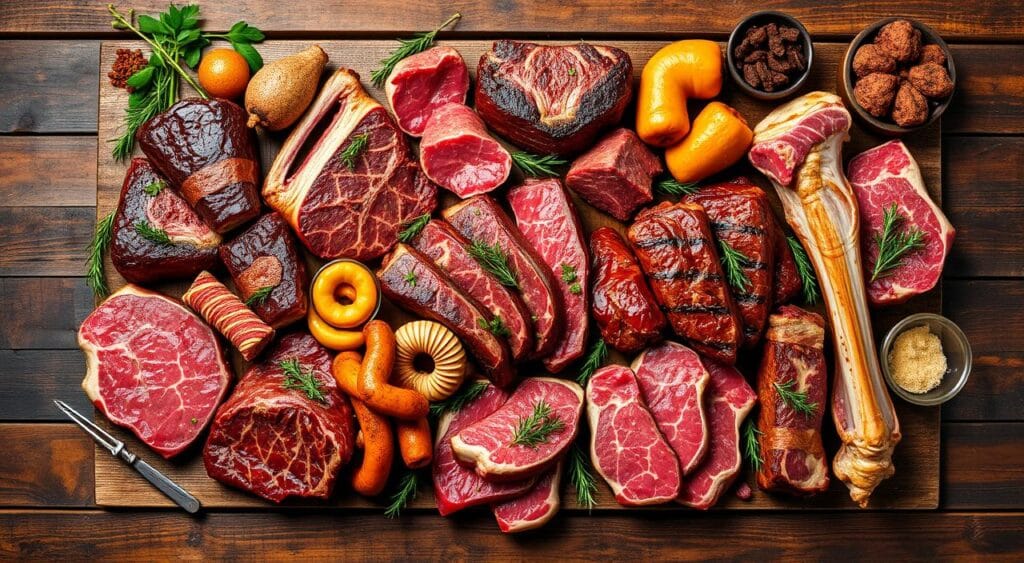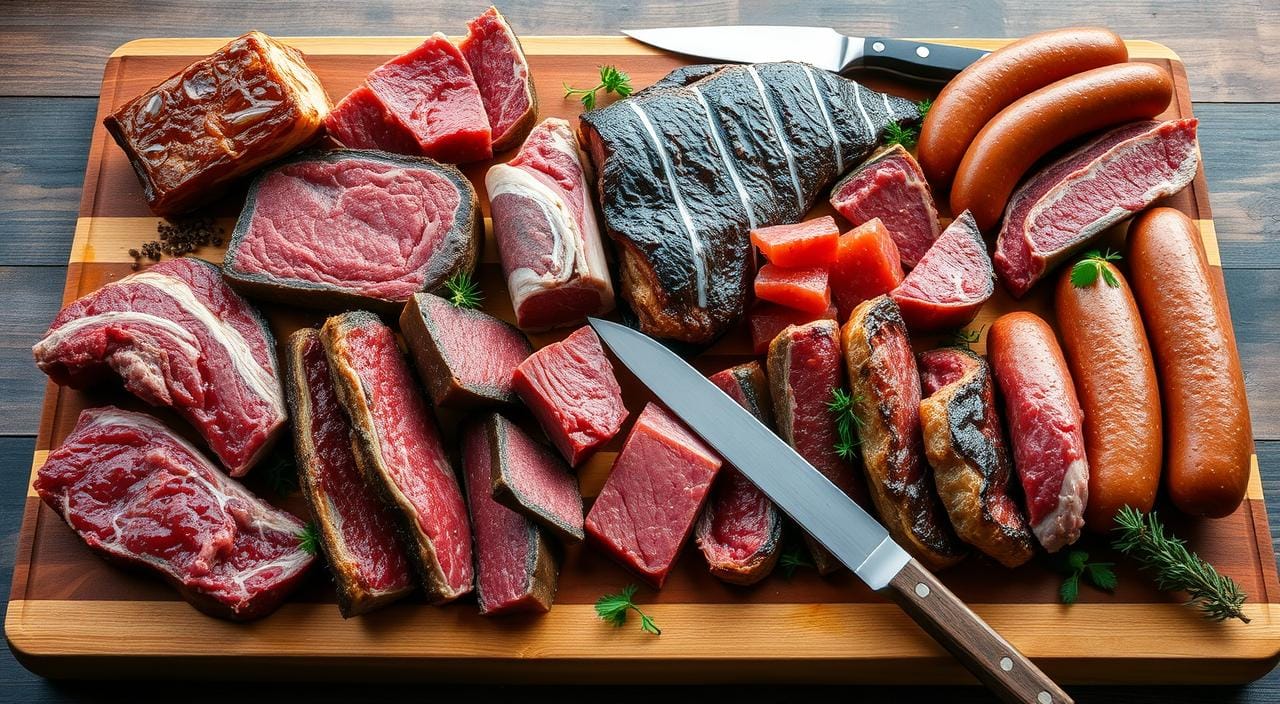Jump to:
Estimated reading time: 13 minutes
Table of contents
Is eating a carnivore diet healthy? The carnivore diet is all about meat, eggs, fish, and animal products. It’s gotten a lot of attention lately. People say it helps with weight loss, mental focus, and less inflammation. But, there’s not much science on its long-term effects, and some worry about its risks.
Some folks might see quick benefits from the carnivore diet. But, it’s important to think about what’s missing. Fruits, veggies, whole grains, and legumes are key for health. They help prevent chronic diseases.
Is eating a carnivore diet healthy? Key Takeaways
- The carnivore diet is a highly restrictive diet that excludes all plant-based foods.
- Potential benefits of the carnivore diet include weight loss, improved mental clarity, and reduced inflammation, but the long-term evidence is limited.
- Concerns about the carnivore diet include the risk of nutrient deficiencies, negative impacts on heart health, and digestive issues.
- It’s crucial to consult with a healthcare professional before undertaking any drastic dietary changes, including the carnivore diet.
- Maintaining a balanced, nutrient-dense diet that includes a variety of plant and animal-based foods is generally recommended for optimal health.
Is eating a carnivore diet healthy? Introduction
The carnivore diet is a strict eating plan that only includes animal-based foods. It leaves out fruits, vegetables, grains, and legumes. People who follow this diet say it helps with weight loss, improves mental focus, and lowers inflammation. But, there’s not much scientific proof to back these claims, making it a hot topic in nutrition.
We’ll look into what the carnivore diet is, its possible benefits and risks, and how it stacks up against other diets. We’ll also share tips for those thinking about trying it and who might want to steer clear.
“The carnivore diet is a restrictive eating plan that eliminates all plant-based foods, focusing solely on animal-based products like meat, fish, eggs, and certain dairy items.”
Even though the carnivore diet is getting more attention, it’s key to understand the science behind it before making big changes to your diet. In the next parts, we’ll explore the details of this debated eating plan.

Is eating a carnivore diet healthy? Understanding the Carnivore Diet
The carnivore diet is a strict diet that has become popular lately. It means eating only animal products like meat, fish, eggs, and dairy. This diet is based on the idea that our ancestors mainly ate meat.
Is eating a carnivore diet healthy? What is the Carnivore Diet?
The carnivore diet is also called the “zero-carb” diet. It’s a very strict version of a diet that’s low in carbs and high in fat and protein. Unlike diets like keto or paleo, it doesn’t allow any plant-based foods.
Is eating a carnivore diet healthy? How It Differs from Other Diets
The carnivore diet is unique because it doesn’t include any plant-based foods. Diets like keto and paleo do include some plant foods, like veggies and fruits. But the carnivore diet only focuses on animal products.
Is eating a carnivore diet healthy? Popularity and Trends
Recently, more people have started following the carnivore diet. They hope it will help with weight loss, diabetes, and other health problems. Shawn Baker, a doctor, is a big supporter of this diet. He points to stories from people who say it helped them. But, there’s no scientific proof of its long-term benefits.
| Carnivore Diet | Keto Diet | Paleo Diet |
|---|---|---|
| Eliminates all plant-based foods | Limits carbohydrate intake, allows some plant-based foods | Emphasizes whole, unprocessed foods, including some plant-based options |
| Focuses solely on animal-based products | Includes a balance of high-fat, moderate-protein, and low-carb foods | Encourages a diet similar to that of our hunter-gatherer ancestors |
| Aims for zero carbohydrates | Typically 70-80% fat, 20-25% protein, 5-10% carbs | Allows for a small amount of carbohydrates from fruits and vegetables |

Nutritional Aspects of the Carnivore Diet
The carnivore diet focuses only on animal-based foods. It has its own set of nutritional aspects. Proponents say it can help with weight loss and improve health. But, it’s important to understand its macronutrient and micronutrient profile.
Macronutrients: Protein and Fat
The carnivore diet is very high in protein and fat. It excludes all plant-based foods. This can be good for weight loss or muscle building because of the high protein.
However, the diet’s strict nature might make it hard to stick to for a long time.
Micronutrients: Vitamins and Minerals
The diet lacks essential micronutrients like vitamin C, folate, and minerals. This is because it excludes fruits, vegetables, and other plant-based foods. It could lead to nutritional deficiencies if not planned carefully.
Lack of Fiber: Impact on Digestion
The carnivore diet has no dietary fiber. Fiber is key for a healthy digestive system. Without it, you might face constipation or diarrhea.
This lack of fiber could also affect your gut health and the balance of gut bacteria.
| Nutrient | Recommended Daily Intake | Carnivore Diet Intake |
|---|---|---|
| Protein | 46-56 grams | Significantly higher |
| Fat | 44-78 grams | Significantly higher |
| Carbohydrates | 275 grams | Minimal, less than 10 grams |
| Fiber | 25-30 grams | Virtually none |
The carnivore diet’s nutritional profile is unique. It has high carnivore diet macros and low carnivore diet micronutrients and carnivore diet fiber. It offers both benefits and risks.
Those thinking about this diet should consider the trade-offs. It’s wise to talk to healthcare professionals to ensure it meets your long-term carnivore diet nutrition needs.
Health Benefits of Eating a Carnivore Diet
The carnivore diet focuses only on animal products, leaving out plant-based foods. It’s known for weight loss, improved mental clarity, and reduced inflammation. These benefits might surprise those who try it.
Weight Loss and Appetite Control
The diet’s main appeal is weight loss. It cuts out carbs, making the body use fat for energy. This leads to fewer calories consumed. The diet’s high protein and fat also help you feel full longer, aiding in weight loss.
Improved Mental Clarity and Focus
Many say the carnivore diet boosts mental clarity and focus. It removes foods that cause brain fog, improving brain function. Some feel more alert and mentally sharp after switching to this diet.
Potential Reduction in Inflammation
The diet’s animal-based foods might lower inflammation. It avoids grains, legumes, and processed carbs that can cause inflammation. This could help those with inflammatory conditions.
Increased Energy and Athletic Performance
People on the carnivore diet often feel more energetic and athletic. The diet’s high fat and protein give a steady energy boost. This makes it easier to reach physical limits.
Despite the diet’s potential benefits, more research is needed. Always talk to a healthcare professional before starting the carnivore diet.
Risks and Drawbacks of the Carnivore Diet
The carnivore diet might have some benefits, but it also has big risks and downsides. This diet cuts out most food groups, leading to health problems.
Potential for Nutrient Deficiencies
By removing all plant-based foods, the carnivore diet can cause nutrient deficiencies. It lacks vitamins like C, E, and folate. This can harm your health.
Impact on Cholesterol and Heart Health
The diet’s high saturated fats and cholesterol can raise heart disease and stroke risks. This is a serious issue.
Possible Digestive Issues
Without fiber from plants, the diet can cause digestive issues. Problems like constipation or diarrhea can affect your health.
Social and Lifestyle Challenges
The diet’s strict rules can make socializing hard. It’s tough to eat out or find food when you’re always eating meat.
In summary, the carnivore diet has benefits but also big risks. A balanced diet with many food types is better for your health.
Comparing the Carnivore Diet to Other Diets
The carnivore diet has become popular lately. But how does it compare to diets like the ketogenic (keto) and Paleo diets? These diets share some similarities but also have key differences.
Carnivore Diet vs. Keto Diet
The carnivore diet and the keto diet both have low carbs. But the carnivore diet goes further by removing all plant foods. The keto diet, however, lets in some plant foods as long as they’re low in carbs.
The keto diet aims for high fat (60-75%), moderate protein (15-30%), and low to zero carbs (5-10%). The carnivore diet, on the other hand, is a zero-carb diet, relying only on animal foods for energy.
Carnivore Diet vs. Paleo Diet
The Paleo diet also focuses on whole, unprocessed foods like the carnivore diet. But the Paleo diet includes fruits, vegetables, nuts, and seeds. The carnivore diet, however, excludes all plant foods.
Carnivore Diet vs. Vegan Diet
The vegan diet is the opposite of the carnivore diet, excluding all animal products. This makes vegan the most restrictive in animal foods. The carnivore diet is the most restrictive in plant foods.
While the carnivore, keto, and Paleo diets share some similarities, the carnivore diet is the most restrictive. It eliminates all plant foods. This can affect nutrient intake, digestion, and health. It’s important to consider these factors when choosing a diet.
| Diet | Carbohydrate Intake | Protein Intake | Fat Intake | Included Food Groups |
|---|---|---|---|---|
| Carnivore Diet | Zero | High | High | Animal-based foods (meat, eggs, dairy) |
| Keto Diet | Low (5-10%) | Moderate (15-30%) | High (60-75%) | Animal-based foods, low-carb plant-based foods |
| Paleo Diet | Moderate | Moderate | Moderate | Animal-based foods, fruits, vegetables, nuts, seeds |
| Vegan Diet | Moderate to High | Moderate | Moderate | Plant-based foods (fruits, vegetables, grains, legumes) |
Tips for Following the Carnivore Diet Safely
If you’re thinking about trying the carnivore diet, be careful and cautious. Start slow and let your body adjust. This is the best way to enjoy a successful carnivore diet journey.
Gradual Transition and Adaptation
Switching to an all-meat diet can be tough. Begin by slowly cutting down on plant-based foods. Increase your intake of high-quality meat, organs, and animal products. This slow change helps your body get used to using fat and protein for energy, not carbs.
Choosing the Right Meat Sources
Choosing the right meat is key on the carnivore diet. Go for grass-fed, organic, and hormone-free beef, poultry, and seafood. This ensures you get the best nutrition and avoid harmful additives.
Monitoring Health Markers
Changing your diet is big, so watch your health closely. Keep an eye on cholesterol, nutrient levels, and how you feel. Regular doctor visits help you stay on track and make diet changes if needed.
“Adapting to the carnivore diet may present challenges such as cravings for carbohydrates, cost concerns, transitioning away from old habits, and potential difficulties in the initial month of the diet, known as the ‘carnivore flu.'”
By following these tips and listening to your body, you can safely try the carnivore diet. You might see benefits like clearer thinking, less inflammation, and better sports performance.
Who Should Avoid the Carnivore Diet?
The carnivore diet has become popular for its health benefits. But, it’s not right for everyone. Let’s look at who should not try this diet and why.
Individuals with Pre-existing Health Conditions
People with certain health issues should not try the carnivore diet. This includes those with high blood pressure, high cholesterol, heart disease, and obesity. The diet’s high protein can make these conditions worse.
Pregnant and Breastfeeding Women
Pregnant and breastfeeding women need special nutrients. The carnivore diet might not give them enough. It lacks the variety needed for a healthy mom and baby.
Children and Adolescents
Children and teens need a lot of nutrients for growth. The carnivore diet focuses too much on animal foods. It might not give them the nutrients they need. Doctors say kids should not follow this diet unless they have a health reason.
In summary, the carnivore diet is not for everyone. People with health issues, pregnant women, and kids should be careful. They should talk to doctors before trying this diet.
Common Misconceptions About the Carnivore Diet
The carnivore diet is often misunderstood, despite its growing popularity. Many think it’s only for weight loss. But, it’s more than that. It can improve mental clarity and boost energy.
Myth: It’s Only for Weight Loss
Some believe the diet causes heart disease. But, the relationship between saturated fats and heart disease is complex. A 2020 systematic review found no link between fresh meat and heart disease. This suggests unprocessed red meat doesn’t increase heart disease risk.
Myth: It Causes Heart Disease
Another myth is that the diet lacks variety and flavor. While it’s more restrictive, it still offers many meat, seafood, and animal-based options. With different cooking and seasonings, it can be both varied and tasty.
Myth: It Lacks Variety and Flavor
By debunking these myths, we can better understand the carnivore diet. It’s important to approach it with an open mind. Always consult with healthcare professionals to see if it’s right for you.
Frequently Asked Questions
Is the carnivore diet healthy?
The healthiness of a carnivore diet, which includes only animal-based foods, is debated. While it can provide high protein and certain nutrients, it lacks fiber, fruits, and vegetables, which are essential for balanced nutrition and gut health.
What are the potential benefits of a carnivore diet?
Some people report benefits on a carnivore diet, such as weight loss, improved mental clarity, and better blood sugar control. These effects may result from eliminating processed foods and refined carbohydrates.
Are there risks associated with the carnivore diet?
Yes, the carnivore diet can increase risks of nutrient deficiencies, especially in fiber, vitamins C and K, and various phytonutrients. It may also raise cholesterol levels and put strain on kidney function due to high protein intake.
Can a carnivore diet improve digestive issues?
Some people report that a carnivore diet improves certain digestive issues, such as bloating or irritable bowel symptoms, possibly due to the elimination of plant foods that can cause sensitivities. However, it may not be sustainable for everyone.
Conclusion
The carnivore diet might help with weight loss and clearer thinking. But, its long-term safety and how well it works are big questions. Cutting out all plant foods could lead to missing important nutrients and harm your health.
Most doctors don’t suggest the carnivore diet. Studies show eating too much red meat can increase heart disease and cancer risks. A study on high-protein diets found it might hurt the kidneys over time.
Thinking about the carnivore diet? Talk to a doctor or dietitian first. They can give advice that fits your health and lifestyle. Eating a variety of whole foods, including plants, is usually better for your health and well-being.






